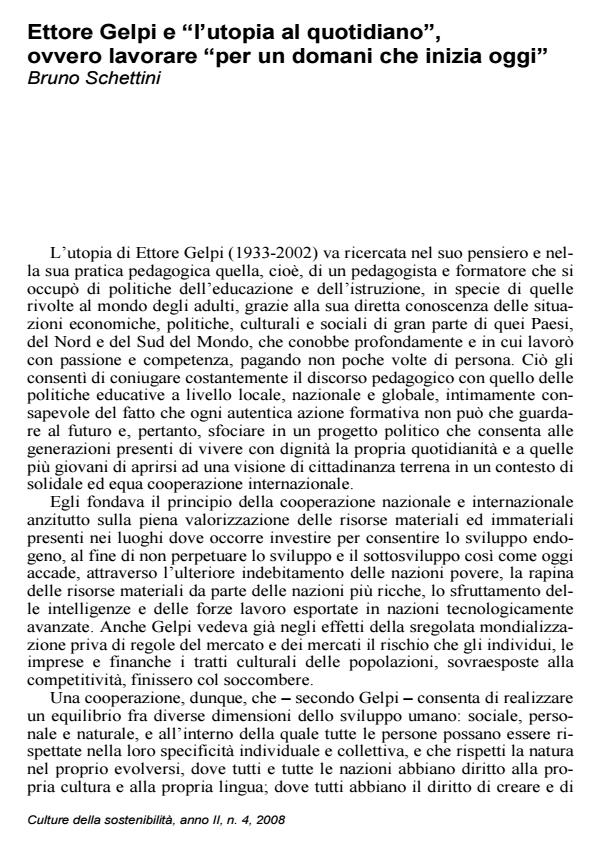Ettore Gelpi e l’utopia al quotidiano, ovvero lavorare per un domani che inizia oggi
Titolo Rivista CULTURE DELLA SOSTENIBILITA '
Autori/Curatori Bruno Schettini
Anno di pubblicazione 2009 Fascicolo 2008/4
Lingua Italiano Numero pagine 16 P. 97-112 Dimensione file 85 KB
DOI
Il DOI è il codice a barre della proprietà intellettuale: per saperne di più
clicca qui
Qui sotto puoi vedere in anteprima la prima pagina di questo articolo.
Se questo articolo ti interessa, lo puoi acquistare (e scaricare in formato pdf) seguendo le facili indicazioni per acquistare il download credit. Acquista Download Credits per scaricare questo Articolo in formato PDF

FrancoAngeli è membro della Publishers International Linking Association, Inc (PILA)associazione indipendente e non profit per facilitare (attraverso i servizi tecnologici implementati da CrossRef.org) l’accesso degli studiosi ai contenuti digitali nelle pubblicazioni professionali e scientifiche
Ettore Gelpi e l’utopia al quotidiano, ovvero lavorare per un domani che inizia oggi - The central problem of adult education, for Ettore Gelpi, is to find a way to help build local and international democracy and defend them practically. According to Gelpi real democracy will come only through that produces History, without self-development and historical thinking men cannot be truly free. To have a thought that produces history, people must have access to fair employment, culture, wealth of the Earth. That’s because you should refer to adult education not only as a tool in order to learn technical knowledge and instrumental work, but also as a way to allow adults to participate actively in the work organization and their lives and, likewise, to define education policies and their practical application in order to ensure full participation in those projects that can develop economical, social and cultural individual and collective impact. Gelpi follows a personal road which can be defined "etnodevelopment", or "reliable development or even "participatory development" that combines ecology and a social project and where the discourse on development ends with looking at everybody because it refers to the lives of present and future generations. Precisely for these reasons, according to Gelpi, all adults are potentially educators. This he claims is a concept that does not like the reactionary, but even too many progressives, because everybody is placed in a position of responsibility and creative research. For this reason, Gelpi opposes both an education that considers adults only as human resources as a growth without review by the stakeholders.
Bruno Schettini, Ettore Gelpi e l’utopia al quotidiano, ovvero lavorare per un domani che inizia oggi in "CULTURE DELLA SOSTENIBILITA '" 4/2008, pp 97-112, DOI: